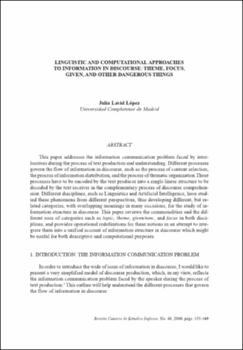Linguistic and Computational Approaches to Information in Discourse: Theme, Focus, Given and Other Dangerous Things
Autor
Lavid López, JuliaFecha
2000Resumen
This paper addresses the information communication problem faced by interlocutors
during the process of text production and understanding. Different processes
govern the flow of information in discourse, such as the process of content selection,
the process of information distribution, and the process of thematic organization.These
processes have to be encoded by the text producer into a single linear structure to be
decoded by the text receiver in the complementary process of discourse comprehension.
Different disciplines, such as Linguistics and Artificial Intelligence, have studied
these phenomena from different perspectives, thus developing different, but related
categories, with overlapping meanings in many occasions, for the study of information
structure in discourse. This paper reviews the commonalities and the different
uses of categories such as topic, theme, given/new, and focus in both disciplines,
and provides operational redefinitions for these notions in an attempt to integrate
them into a unified account of information structure in discourse which might
be useful for both descriptive and computational purposes.





